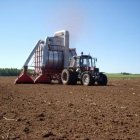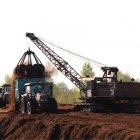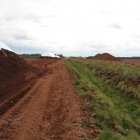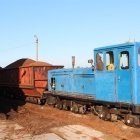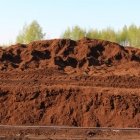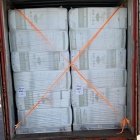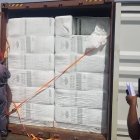Sphagnum Peat Moss
Peat moss, also known as Sphagnum moss or Sphagnum Peat Moss, is a type of moss that grows in acidic, water-logged environments such as bogs and swamps. It forms a thick layer of organic material on the surface of the ground, which over time, can accumulate and decompose to form peat. Peat is composed of partially decomposed plant material, including Sphagnum moss, and is an important component of many soil types.
In horticulture, peat moss is commonly used as a soil amendment or a main component of growing mixes for plants. It is prized for its ability to hold water, improve soil structure, and provide nutrients to plants.
- Moisture Retention: Peat moss is highly absorbent and can retain a significant amount of water. This makes it ideal for growing plants that require a moist environment, as it helps to prevent the soil from drying out and helps retain moisture around plant roots.
- Aeration: Despite its moisture-retaining properties, peat moss is also porous, which means it allows air to circulate around the roots of plants. Good aeration is essential for healthy root growth.
- Nutrient content: Peat moss contains small amounts of essential plant nutrients such as nitrogen, phosphorus, and potassium, as well as trace elements such as iron, manganese, and copper. It is actually one of its best advantages in horticulture. Peat moss provides a stable and consistent growing environment without providing an excess of nutrients, which can be adjusted with fertilizers as needed. This allows growers to have more control over the nutrient levels in their soil and provides a greater degree of flexibility in their plant care practices.
- Improved root growth: Peat moss has a spongy texture that encourages root growth, and its high water-holding capacity helps keep roots hydrated.
- Sterility: Peat moss is harvested from bogs, which are naturally free from pathogens and weeds. This makes it a “clean” growing medium that is less likely to spread disease or invasive species compared to alternatives.
- Additionally, peat moss has a low pH level, making it ideal for growing acid-loving plants such as blueberries and rhododendrons.
Our company offers all types of Sphagnum peat moss to professional growers, landscape companies, farmers, retailers and local potting soil producers in more than 60 countries worldwide. We export to all Europe, Asia, North and South America, Middle East and Africa. We also produce Professional Peat Substrates for professionals and retail markets.
Please feel free to contact us by E-mail (export@peatmoss.lt) or Phone/WhatsApp: +370 655 99 111 for any technical information, current supply ability and prices on all our products. You can also fill out our RFQ form online and we will get back to you shortly.
Type of product: Lithuanian White Sphagnum Peat Moss
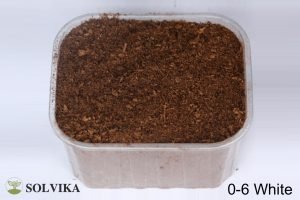 |
| Fraction (screening) |
Extra-Fine (0-6) |
| pH (H2O) EN13037 |
3.5-4.5 |
| Packaging (EN12580) |
50L, 70L, 250L, 6000L |
| Raw weight |
130-200 kg/1000L |
|
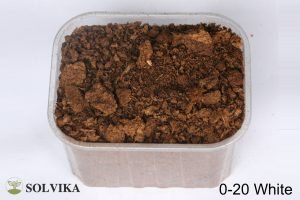 |
| Fraction (screening) |
Medium (0-20) |
| pH (H2O) EN13037 |
3.5-4.5 |
| Packaging (EN12580) |
50L, 70L, 250L, 6000L |
| Raw weight |
130-200 kg/1000L |
|
 |
| Fraction (screening) |
Medium-Coarse (0-40) |
| pH (H2O) EN13037 |
3.5-4.5 |
| Packaging (EN12580) |
50L, 70L, 250L, 6000L |
| Raw weight |
130-200 kg/1000L |
|
| Type of peat: |
Slightly decomposed high-moor peat moss
|
| Organic matter (of dry weight) |
>90 %
|
| pH (H2O) |
pH 3.5-4.5 (EN13037) |
| EC (H2O) |
< 0.15 mS/cm (EN13038) (low salt content) |
| Moisture |
40–55 % (EN13040) |
Type of product: Lithuanian Black Sphagnum Peat Moss
 |
| Fraction (screening) |
Extra-Fine (0-6) |
| pH (H2O) EN13037 |
3.5-4.5 |
| Packaging (EN12580) |
50L, 70L, 225L, 5000L |
| Raw weight |
200-300 kg/1000L |
|
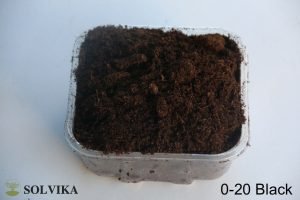 |
| Fraction (screening) |
Medium (0-20) |
| pH (H2O) EN13037 |
3.5-4.5 |
| Packaging (EN12580) |
50L, 70L, 225L, 5000L |
| Raw weight |
200-300 kg/1000L |
|
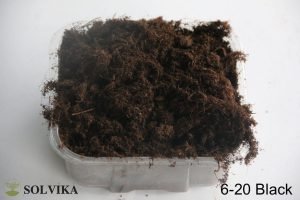 |
| Fraction (screening) |
Medium-Coarse (6-20) |
| pH (H2O) EN13037 |
3.5-4.5 |
| Packaging (EN12580) |
50L, 70L, 250L, 5000L |
| Raw weight |
200-300 kg/1000L |
|
| Type of peat: |
Moderately to highly decomposed high-moor peat moss
|
| Organic matter (of dry weight) |
>90 %
|
| pH (H2O) |
pH 3.5-4.5 (EN13037) |
| EC (H2O) |
< 0.15 mS/cm (EN13038) (low salt content) |
| Moisture |
40–55 % (EN13040) |
Type of product: MIX of White and Black Sphagnum Peat Moss (50/50)
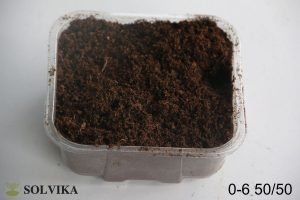 |
| Fraction (screening) |
Extra-Fine (0-6) |
| pH (H2O) EN13037 |
3.5-4.5 |
| Packaging (EN12580) |
50L, 70L, 250L, 5000L |
| Raw weight |
150-250 kg/1000L |
|
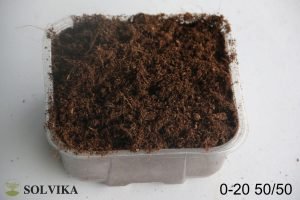 |
| Fraction (screening) |
Medium (0-20) |
| pH (H2O) EN13037 |
3.5-4.5 |
| Packaging (EN12580) |
50L, 70L, 250L, 5000L |
| Raw weight |
150-250 kg/1000L |
|
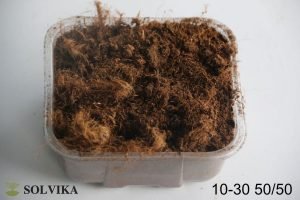 |
| Fraction (screening) |
Medium-Coarse (10-30) |
| pH (H2O) EN13037 |
3.5-4.5 |
| Packaging (EN12580) |
50L, 70L, 250L, 5000L |
| Raw weight |
150-250 kg/1000L |
|
| Type of peat: |
Mix of Slightly and Moderately to highly decomposed high-moor peat moss
|
| Organic matter (of dry weight) |
>90 %
|
| pH (H2O) |
pH 3.5-4.5 (EN13037) |
| EC (H2O) |
< 0.15 mS/cm (EN13038) (low salt content) |
| Moisture |
40–55 % (EN13040) |
Type of product: Latvian White Sphagnum Peat Moss
 |
| Fraction (screening) |
Fine (0-10) |
| pH (H2O) EN13037 |
3.5-4.5 |
| Packaging (EN12580) |
250L, 6000L |
| Raw weight |
80-200 kg/1000L |
|
 |
| Fraction (screening) |
Medium (0-20) |
| pH (H2O) EN13037 |
3.5-4.5 |
| Packaging (EN12580) |
250L, 6000L |
| Raw weight |
80-200 kg/1000L |
|
 |
| Fraction (screening) |
Medium-Coarse (0-40) |
| pH (H2O) EN13037 |
3.5-4.5 |
| Packaging (EN12580) |
250L, 6000L |
| Raw weight |
80-200 kg/1000L |
|
| Type of peat: |
Slightly decomposed high-moor peat moss
|
| Organic matter (of dry weight) |
95-99 % |
| pH (H2O) |
pH 3.5-4.5 (EN13037) |
| EC (H2O) |
< 0.15 mS/cm (EN13038) (low salt content) |
| Moisture |
40–55 % (EN13040) |
| Screening sizes available |
0-10, 0-20, 0-40 |
















